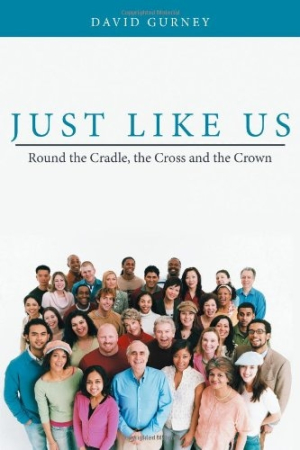Just Like Us
Round the Cradle, the Cross and the Crown
“It all seemed such a good idea at first,” explains Judas Iscariot of his betrayal of Christ. Judas’s tortured musings make up one of the twenty-one “snapshots” of life with Jesus found in David Gurney’s book, Just Like Us: Round the Cradle, the Cross and the Crown. Organized into three sections, Gurney provides a unique and human look at the life of Christ as seen through the eyes of his contemporaries.
Judas’s motivation for betraying Jesus—that it would “compel [Jesus] to act against his domestic enemies and sweep him on to raise the standard of revolt against the Romans”—is not a new theme, but the wayward apostle’s explanation adds a poignancy rarely found in print. Most of the other remembrances of Christ in Gurney’s book have a much lighter, and at times even humorous, tone. The best recollection may be that of Joseph, who opens his chapter with, “It is not easy being a known descendant of a deposed royal family.”
Gurnsey gives each of the historical characters a unique voice. Herod the Great is a pompous ass who is annoyed at having to play host to three “over dressed self-important posturers” who claim to be kings following a star. Pontius Pilate is a bureaucrat who writes to Tiberius Caesar hoping for a reward at having “nipped in the bud” a potential uprising by a “populist leader” from Nazareth. The unidentified Roman soldier known to history simply as “the Centurion” grumbles like soldiers always do at being posted to a place so remote that it feels like “a sentence of banishment”—a punishment that is made worse because it is “the home of those religious nutcases, the Jews.”
Several of the apostles and others who followed Jesus are given a voice here, as are individuals who only met him once, among them the rabbi Simeon, the high priest Caiaphas, and Simon of Cyrene, who helped carry the cross on what would become known as the Via Dolorosa (Way of Grief).
Other characters, notably the Temple Guard who will be “jolly well glad when this tour of duty is over,” and the Innkeeper, who is so harried by visitors who have come to Jerusalem for the census that he is “tempted to just pack it all in,” provide snapshots not so much of the life of Christ as of life itself during the first century. The inclusion of such lighter tales sandwiched between the heavier remembrances of Mary of Magdala, Simon Peter, and Thomas give Gurney’s book a nice crest-and-trough feel.
Gurney’s work is neither groundbreaking nor earthshaking, but it is well and lovingly written, and done so with a sense of humor as well as a sense of faith. It is a short, easy read with chapters that are themselves little prayers. Just Like Us is an enjoyable and engaging peek into the life of Christ and the times in which he lived.
Reviewed by
Mark McLaughlin
Disclosure: This article is not an endorsement, but a review. The publisher of this book provided free copies of the book and paid a small fee to have their book reviewed by a professional reviewer. Foreword Reviews and Clarion Reviews make no guarantee that the publisher will receive a positive review. Foreword Magazine, Inc. is disclosing this in accordance with the Federal Trade Commission’s 16 CFR, Part 255.

